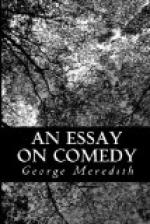But if the Comic idea prevailed with us, and we had an Aristophanes to barb and wing it, we should be breathing air of Athens. Prosers now pouring forth on us like public fountains would be cut short in the street and left blinking, dumb as pillar-posts, with letters thrust into their mouths. We should throw off incubus, our dreadful familiar—by some called boredom—whom it is our present humiliation to be just alive enough to loathe, never quick enough to foil. There would be a bright and positive, clear Hellenic perception of facts. The vapours of Unreason and Sentimentalism would be blown away before they were productive. Where would Pessimist and Optimist be? They would in any case have a diminished audience. Yet possibly the change of despots, from good-natured old obtuseness to keen-edged intelligence, which is by nature merciless, would be more than we could bear. The rupture of the link between dull people, consisting in the fraternal agreement that something is too clever for them, and a shot beyond them, is not to be thought of lightly; for, slender though the link may seem, it is equivalent to a cement forming a concrete of dense cohesion, very desirable in the estimation of the statesman.
A political Aristophanes, taking advantage of his lyrical Bacchic licence, was found too much for political Athens. I would not ask to have him revived, but that the sharp light of such a spirit as his might be with us to strike now and then on public affairs, public themes, to make them spin along more briskly.
He hated with the politician’s fervour the sophist who corrupted simplicity of thought, the poet who destroyed purity of style, the demagogue, ‘the saw-toothed monster,’ who, as he conceived, chicaned the mob, and he held his own against them by strength of laughter, until fines, the curtailing of his Comic licence in the chorus, and ultimately the ruin of Athens, which could no longer support the expense of the chorus, threw him altogether on dialogue, and brought him under the law. After the catastrophe, the poet, who had ever been gazing back at the men of Marathon and Salamis, must have felt that he had foreseen it; and that he was wise when he pleaded for peace, and derided military coxcombry, and the captious old creature Demus, we can admit. He had the Comic poet’s gift of common-sense—which does not always include political intelligence; yet his political tendency raised him above the Old Comedy turn for uproarious farce. He abused Socrates, but Xenophon, the disciple of Socrates, by his trained rhetoric saved the Ten Thousand. Aristophanes might say that if his warnings had been followed there would have been no such thing as a mercenary Greek expedition under Cyrus. Athens, however, was on a landslip, falling; none could arrest it. To gaze back, to uphold the old times, was a most natural conservatism, and fruitless. The aloe had bloomed. Whether right or wrong in his politics and his criticisms, and bearing in mind the instruments he played on and the audience he had to win, there is an idea in his comedies: it is the Idea of Good Citizenship.




